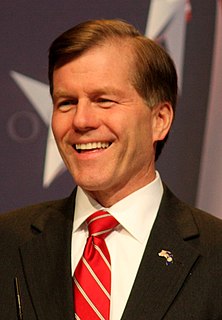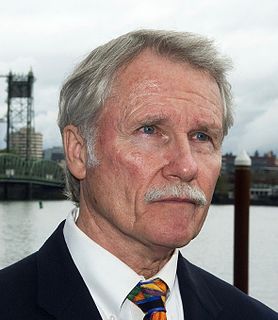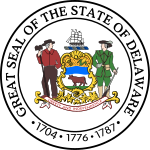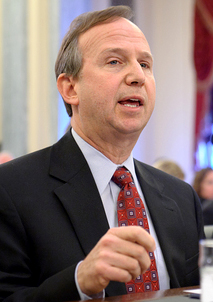
United States gubernatorial elections were held Tuesday, November 4, 2008 in 11 states and two territories. Prior to the election, eight of the total seats were held by Democrats and five by Republicans. Two governors were prohibited by term limits from seeking re-election in 2008.

The election for Governor of Delaware took place on November 4, 2008, coinciding with the United States presidential election. Democrat Jack Markell was elected governor, succeeding incumbent Ruth Ann Minner, also a Democrat, who was prevented from running for a third term.

United States gubernatorial elections were held in 12 states and two territories. Of the eight Democratic and four Republican seats contested, only that of North Carolina changed party hands, giving the Republicans a net gain of one governorship. These elections coincided with the presidential election on November 6, 2012.

The 2012 Missouri gubernatorial election was held on November 6, 2012, to elect the Governor of Missouri. Democratic incumbent Jay Nixon won re-election against the Republican nominee, businessman Dave Spence.

The 2012 Indiana gubernatorial election took place on November 6, 2012. Incumbent governor Mitch Daniels was term-limited and unable to seek a third term. The Republican candidate, Congressman Mike Pence; the Democratic candidate, former Speaker of the Indiana House of Representatives John R. Gregg; and the Libertarian candidate, youth mentor, small business owner and reality TV personality, Rupert Boneham, were all unopposed in their respective primaries or conventions and contested the general election.

The 2012 United States Senate election in Delaware took place on November 6, 2012, concurrently with the 2012 U.S. presidential election as well as other elections to the United States Senate and House of Representatives and various state and local elections. Incumbent Democratic U.S. Senator Tom Carper won re-election to a third term in a landslide.

The 2012 North Dakota gubernatorial election was held on November 6, 2012, to elect a governor and lieutenant governor of North Dakota. Incumbent Governor Jack Dalrymple succeeded to the office when then-Governor John Hoeven resigned to take a seat in the United States Senate. Dalrymple, a member of the Republican Party, won election to a first full term. Ryan Taylor was the Democratic nominee. Jack Dalrymple prevailed with 63% of the vote.

The 2012 Vermont gubernatorial election took place on November 6, 2012, to elect the Governor of Vermont. Incumbent Democratic Governor Peter Shumlin won re-election to a second term, making this the only gubernatorial election in which he won a majority of the vote.

The 2012 West Virginia gubernatorial election was held on November 6, 2012, to elect the governor of West Virginia. Democratic incumbent Earl Ray Tomblin, who was elected governor in a special election in 2011, was elected to a full four-year term. The election was a rematch of the 2011 special election.

Delaware's 2012 general elections were held on November 6, 2012. Primary elections were held on September 11, 2012.

The 2014 Minnesota gubernatorial election took place on November 4, 2014, to elect the governor of Minnesota concurrently with the election to Minnesota's Class II U.S. Senate seat, as well as other elections to the United States Senate in other states and elections to the United States House of Representatives and various state and local elections.

The 2014 Oregon gubernatorial election was held on November 4, 2014, to elect the Governor of Oregon, concurrently with other in Oregon and across the United States.

United States gubernatorial elections were held on November 8, 2016 in 12 states and two territories. The last regular gubernatorial elections for nine of the 12 states took place in 2012. The last gubernatorial elections for New Hampshire, Oregon, and Vermont took place in 2014, as Oregon held a special election due to the resignation of governor John Kitzhaber, while the governors of New Hampshire and Vermont both serve two-year terms. The 2016 gubernatorial elections took place concurrently with several other federal, state, and local elections, including the presidential election, Senate, and House elections.

United States gubernatorial elections were held on November 7, 2017 in two states: Virginia and New Jersey. These elections formed part of the 2017 United States elections. The last regular gubernatorial elections for these two states were in 2013. Both incumbents were term-limited, so both seats were open.

The 2016 Delaware gubernatorial election took take place on November 8, 2016, to elect the Governor of Delaware, concurrently with the 2016 U.S. presidential election, as well as elections to the United States Senate in other states and elections to the United States House of Representatives and various state and local elections.

A general election was held in the U.S. state of Delaware on November 4, 2014. Half of Delaware's executive officers were up for election as well as a United States Senate seat and Delaware's at-large seat in the United States House of Representatives. Primary elections were held on September 9, 2014.

The 2016 United States presidential election in Georgia was held on November 8, 2016, as part of the 2016 General Election in which all 50 states plus Washington, D.C. participated. Georgia voters chose electors to represent them in the Electoral College via a popular vote pitting the Republican Party's nominee, businessman Donald Trump, and running mate Indiana Governor Mike Pence against Democratic Party nominee, former Secretary of State Hillary Clinton and her running mate, Virginia Senator Tim Kaine.

The 2016 United States presidential election in Oregon was held on November 8, 2016, as part of the 2016 General Election in which all 50 states plus The District of Columbia participated. Oregon voters chose electors to represent them in the Electoral College via a popular vote pitting the Republican Party's nominee, businessman Donald Trump, and running mate Indiana Governor Mike Pence against Democratic Party nominee, former Secretary of State Hillary Clinton and her running mate, Virginia Senator Tim Kaine.

United States gubernatorial elections will be held on November 3, 2020 in 11 states and two territories. In addition, special elections may take place if other gubernatorial seats are vacated. The last regular gubernatorial elections for nine of the eleven states took place in 2016. The last gubernatorial elections for New Hampshire and Vermont took place in 2018, as the governors of both states serve two-year terms. All state governors will be eligible for reelection except for Steve Bullock of Montana, although other governors may choose to retire. The 2020 gubernatorial elections will take place concurrently with several other federal, state, and local elections, including the presidential election.



















